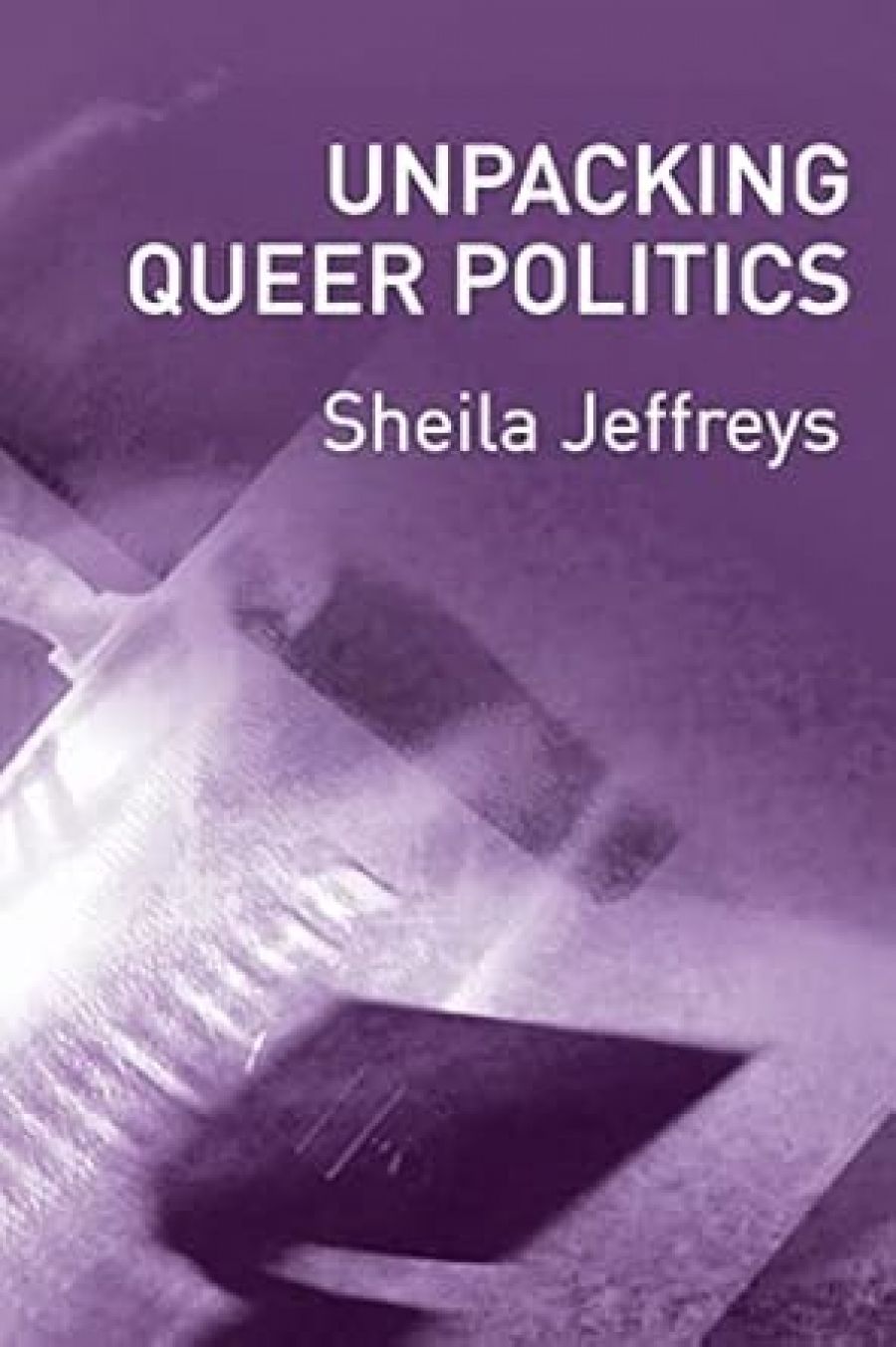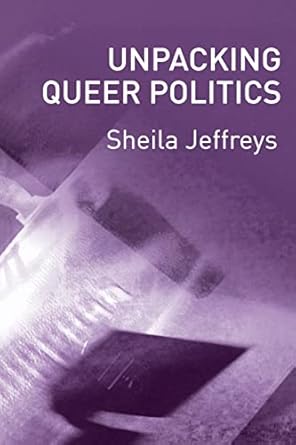
- Free Article: No
- Contents Category: Gay Studies
- Review Article: Yes
- Article Title: Fear of Difference
- Online Only: No
- Custom Highlight Text:
Reviewing a book is rarely a simple exercise and those who think it is should pause before accepting the commission. It is a delicate exercise, this balancing of critique, subjectivity, envy and even-handedness. You never quite know if you have hit the right balance. A nagging fear of being ungracious, and revealing too much of the self, can result in days of procrastination. This degree of difficulty is multiplied when reviewing a book that directly attacks one’s chosen way of life, as is the case in this book’s denunciation of gay male sexual practice. So let me be honest. I had a pretty good idea what I was getting into when I agreed to review Sheila Jeffreys’s latest lesbian feminist offering, Unpacking Queer Politics. Nine years ago, I wrote a review of Jeffreys’s work for a postgraduate politics journal. It was a ‘swingeing critique’ - a phrase Jeffreys deploys frequently in Unpacking Queer Politics when she approvingly cites likeminded theorists - and Dr Jeffreys was none too pleased. As we both worked in the same building at Melbourne University, this made for some uncomfortable elevator rides.
- Book 1 Title: Unpacking Queer Politics
- Book 1 Biblio: Polity Press, $49.95pb, 189 pp
- Book 1 Cover Small (400 x 600):

- Book 1 Cover (800 x 1200):

After that skirmish, I wasn’t greatly surprised by Unpacking Queer Politics. The book is a continuation of Jeffreys’s project to unmask and address the oppressive institutions and practices of a heteropatriachal world. Hers is a polemical voice, and one that gets considerable attention. Jeffreys’s analysis stems from the glory days of British revolutionary lesbian feminism and American lesbian feminist separatism. These two movements peaked sometime in the late 1970s, and there are plenty of citations in Unpacking Queer Politics from this softly lit era of lesbian feminist praxis.
From this theory, and across five books, Jeffreys has formulated a distinctly pessimistic sociology of sexuality. In the opening pages of this book, she recaps her argument. Sex as constructed and practised through the institution of heterosexuality is remorselessly exploitative of women. In this model, sex - and in particular penetrative sex - is not simply an effect of oppression: it is a key practice through which patriarchy is sustained. On the question of what nonpatriarchal sex might entail, Jeffreys has always been suitably coy. There are some clues in Unpacking Queer Politics that such sex might involve two individuals, more likely women, lying side by side, softly touching each other’s bodies for hours.
Preferring greater exertion, I call this massage. But being a good libertarian, I’m happy for others to define sex as they wish. Jeffreys, however, draws a wider theoretical bow. She distinguishes between ‘heterosexual desire’, which ‘originates in male power and female subordination and eroticizes power differentials’, and ‘homosexual desire’, which ‘eroticizes sameness of power or equality’. Homosexual desire takes the guernsey, and Jeffreys nominates lesbian feminists like herself as ‘the vanguard of radical social change’. In revolutionary theory, as in sex, modesty and desire are often incompatible.
The sexual plot thickens when Jeffreys turns her gaze on gay men. Far from practising homosexual desire, Jeffreys suggests, gay men’s infatuation with pornography, leather, public sex, S&M, and anal sex (whether top, bottom or versatile) makes them among the leading practitioners of heterosexual desire. This, at least, should make my mother happy, if a little dazed. But Jeffreys goes further in her critique of gay sexuality, citing one lesbian philosopher’s contention that male homosexuality is a bulwark of male supremacy.
This makes for grim reading, especially if you are a gay. Responsibility for the passing of Paradise Lost of 1970s lesbian feminism is sheeted home primarily to patriarchal gay men, and then those lesbians who were foolish enough in the 1980s to mimic their sexual practice. Throw in the emergence of postmodern theory and an ever-expanding ‘sex industry’, and the scene is set for the pernicious 1990s reign of queer politics. By book’s end, Jeffreys has unpacked a bleak case of contemporary homosexualities. It is a world of despair and alienation, cutting and self-mutilation, rampant sexual exploitation and abuse, increasing HIV infections, and the most unforgivable of betrayals, women who choose to become men. Only a few brave dissident voices can be heard maintaining a lesbian feminist vision of equality through sameness. Not coincidentally, given this privileging of sameness, these voices echo Jeffreys.
There are few books that leave me almost inarticulate with frustration - Unpacking Queer Politics is one. Jeffreys is at her best when critiquing the naïve idealism and overblown claims of some sexual libertarianism, and there is a grain of truth in her complaints. Sometimes sex is exploitative; more often it is mundane. There is no magic freedom, sexual or otherwise, and, in pursuing sexual pleasure, there should be space for ethical practice. But the ethical positions Jeffreys dictates are harsh and uncompromising, and occasionally irresponsible. To suggest that condoms are no solution to HIV infection because they continue to encourage anal intercourse is strictly correct, but practically reprehensible.
The latter example encapsulates my frustration with Unpacking Queer Politics. This is a book of extremes: there is no space for ambiguity or ambivalence, nor an appreciation of the unpredictability of sex. It seizes on the uncertainties of contemporary sexual and social life, and proffers fundamentalist answers. It is written in a fashion that brooks no hesitation or uncertainty: you are either with lesbian feminists and equality, or implacably against both. For all the talk of equality and freedom, the book produces a sense of coercion, a traumatic narrowing of debate and choice. Finally, I’m left wondering whether, beneath this book’s privileging of ‘homosexual desire’ and sameness, there lies a fear of difference that verges upon terror.


Comments powered by CComment